Preview Only
No bids or purchases accepted at this time.
Susan Rowland
172
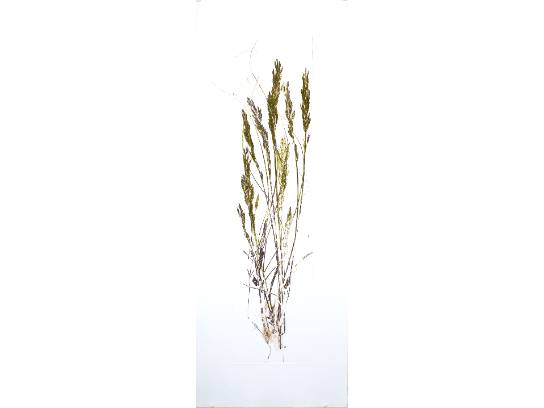
Grasses 075
$0Grasses 075, ~1998 - 2005
Monoprint, 1/1, Estate stamp
11.5 x 30"
Rowland scoured her Brooklyn neighborhood
to find weeds for her monoprints.
Price available upon request
Artist Bio:
Susan Scott Rowland
1940 - 2019
Susan was a trustee of the Brooklyn Arts Council and was an avid supporter of Brooklyn Arts Council's mission to promote art in Brooklyn.
Her work is in major public and private collections, including the Whitney Museum of American Art, New York Historical Society, Santa Fe's Fine Arts Museum, and New Mexico's Roswell Museum and Art Center.
Rowland channeled an irrepressible exuberance through her work as a painter, printmaker and ceramicist. Rowland worked in New York for most of four decades, creating large, abstract expressionist canvasses and, later, pottery and sculpture with rough edges and whimsical animal forms. She graduated from Vassar College. In 1961 she married Dr. George B. "Robin'' Rowland. Her husband became a public health doctor when they moved to the Navajo reservation in Arizona with their two young children. Her restless personality and creative drive did not allow her to settle for long in one place. In 1967 she moved to New York City with her children. There, she studied at the Arts Students League. In 1974 she moved west again to a rural community north of Santa Fe, NM. She had space of her own in which to paint, and a rugged landscape to serve for inspiration. She was awarded a National Endowment for the Arts fellowship in 1976. Three years later, she returned to New York where she met and married her second husband, Charles P. "Tony'' Sifton, a judge in the US District Court in Brooklyn. After the terrorist attacks of 2001, Rowland pulled the first new weeds growing near Ground Zero the next spring to make monoprints. "I wanted to print the first plants that showed up, the weeds, the volunteers,'' Rowland said in a column by Times garden writer Anne Raver. She was a trustee of the non-profit Brooklyn Arts Council, where donations in Susan's name may be directed.
173
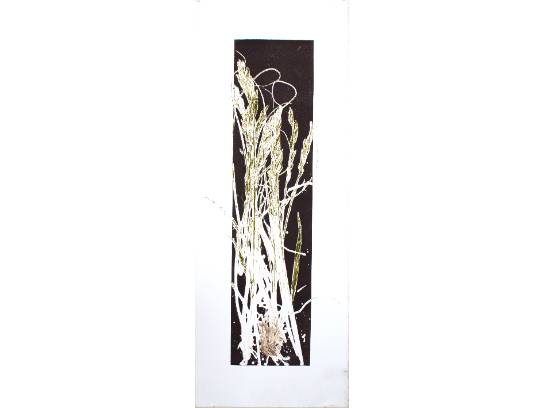
Grasses 074
$450Grasses 074, ~1998-2005
22.5 x 30"
Monoprint, 1/1, Estate stamp
11.5 x 30"
Rowland's botanical monoprints lead her to develop the concept for the 9/11 Monoprint Series.
Price available upon request.
Artist Bio:
Susan Scott Rowland
1940 - 2019
Susan was a trustee of the Brooklyn Arts Council and was an avid supporter of Brooklyn Arts Council's mission to promote art in Brooklyn.
Her work is in major public and private collections, including the Whitney Museum of American Art, New York Historical Society, Santa Fe's Fine Arts Museum, and New Mexico's Roswell Museum and Art Center.
Rowland channeled an irrepressible exuberance through her work as a painter, printmaker and ceramicist. Rowland worked in New York for most of four decades, creating large, abstract expressionist canvasses and, later, pottery and sculpture with rough edges and whimsical animal forms. She graduated from Vassar College. In 1961 she married Dr. George B. "Robin'' Rowland. Her husband became a public health doctor when they moved to the Navajo reservation in Arizona with their two young children. Her restless personality and creative drive did not allow her to settle for long in one place. In 1967 she moved to New York City with her children. There, she studied at the Arts Students League. In 1974 she moved west again to a rural community north of Santa Fe, NM. She had space of her own in which to paint, and a rugged landscape to serve for inspiration. She was awarded a National Endowment for the Arts fellowship in 1976. Three years later, she returned to New York where she met and married her second husband, Charles P. "Tony'' Sifton, a judge in the US District Court in Brooklyn. After the terrorist attacks of 2001, Rowland pulled the first new weeds growing near Ground Zero the next spring to make monoprints. "I wanted to print the first plants that showed up, the weeds, the volunteers,'' Rowland said in a column by Times garden writer Anne Raver. She was a trustee of the non-profit Brooklyn Arts Council, where donations in Susan's name may be directed.
175

West Street
$0West Street, 2000
9/11 Monoprint, 1/1, framed and signed
15.75 x 15.75"
Rowland wondered what would grow first around the ruins after 9/11. In the collection of the Whitney Museum.
Price available upon request.
Artist Bio:
Susan Scott Rowland
1940 - 2019
Susan was a trustee of the Brooklyn Arts Council and was an avid supporter of Brooklyn Arts Council's mission to promote art in Brooklyn.
Her work is in major public and private collections, including the Whitney Museum of American Art, New York Historical Society, Santa Fe's Fine Arts Museum, and New Mexico's Roswell Museum and Art Center.
Rowland channeled an irrepressible exuberance through her work as a painter, printmaker and ceramicist. Rowland worked in New York for most of four decades, creating large, abstract expressionist canvasses and, later, pottery and sculpture with rough edges and whimsical animal forms. She graduated from Vassar College. In 1961 she married Dr. George B. "Robin'' Rowland. Her husband became a public health doctor when they moved to the Navajo reservation in Arizona with their two young children. Her restless personality and creative drive did not allow her to settle for long in one place. In 1967 she moved to New York City with her children. There, she studied at the Arts Students League. In 1974 she moved west again to a rural community north of Santa Fe, NM. She had space of her own in which to paint, and a rugged landscape to serve for inspiration. She was awarded a National Endowment for the Arts fellowship in 1976. Three years later, she returned to New York where she met and married her second husband, Charles P. "Tony'' Sifton, a judge in the US District Court in Brooklyn. After the terrorist attacks of 2001, Rowland pulled the first new weeds growing near Ground Zero the next spring to make monoprints. "I wanted to print the first plants that showed up, the weeds, the volunteers,'' Rowland said in a column by Times garden writer Anne Raver. She was a trustee of the non-profit Brooklyn Arts Council, where donations in Susan's name may be directed.
176

Edgar Street
$0Edgar Street, 2002
9/11 Monoprint, 1/1, signed and framed
29.75 x 22.5"
After the 2001 terrorist attacks, Rowland pulled the first weeds growing near Ground Zero to make monoprints. In the collection of the Whitney Museum.
Price available upon request.
Artist bio:
Susan Scott Rowland
1940 - 2019
Susan was a trustee of the Brooklyn Arts Council and was an avid supporter of Brooklyn Arts Council's mission to promote art in Brooklyn.
Her work is in major public and private collections, including the Whitney Museum of American Art, New York Historical Society, Santa Fe's Fine Arts Museum, and New Mexico's Roswell Museum and Art Center.
Rowland channeled an irrepressible exuberance through her work as a painter, printmaker and ceramicist. Rowland worked in New York for most of four decades, creating large, abstract expressionist canvasses and, later, pottery and sculpture with rough edges and whimsical animal forms. She graduated from Vassar College. In 1961 she married Dr. George B. "Robin'' Rowland. Her husband became a public health doctor when they moved to the Navajo reservation in Arizona with their two young children. Her restless personality and creative drive did not allow her to settle for long in one place. In 1967 she moved to New York City with her children. There, she studied at the Arts Students League. In 1974 she moved west again to a rural community north of Santa Fe, NM. She had space of her own in which to paint, and a rugged landscape to serve for inspiration. She was awarded a National Endowment for the Arts fellowship in 1976. Three years later, she returned to New York where she met and married her second husband, Charles P. "Tony'' Sifton, a judge in the US District Court in Brooklyn. After the terrorist attacks of 2001, Rowland pulled the first new weeds growing near Ground Zero the next spring to make monoprints. "I wanted to print the first plants that showed up, the weeds, the volunteers,'' Rowland said in a column by Times garden writer Anne Raver. She was a trustee of the non-profit Brooklyn Arts Council, where donations in Susan's name may be directed.
177
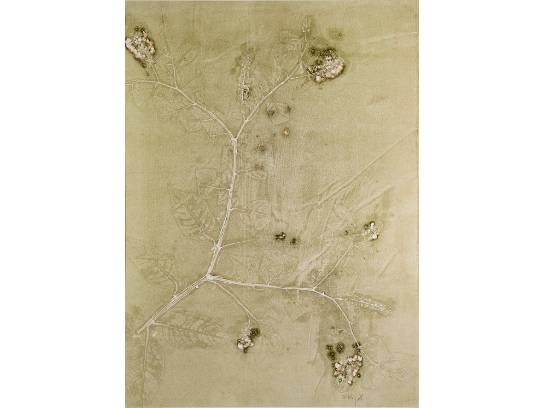
Botanical 239
$0Botanical 239, ~1998 - 2005
Monoprint, 1/1, signed
22.5 x 30"
For years, Rowland made monoprints of city weeds from parking lots, cracks in the sidewalk, gutters and demolition sites.
Price available upon request.
Artist bio:
Susan Scott Rowland
1940 - 2019
Susan was a trustee of the Brooklyn Arts Council and was an avid supporter of Brooklyn Arts Council's mission to promote art in Brooklyn.
Her work is in major public and private collections, including the Whitney Museum of American Art, New York Historical Society, Santa Fe's Fine Arts Museum, and New Mexico's Roswell Museum and Art Center.
Rowland channeled an irrepressible exuberance through her work as a painter, printmaker and ceramicist. Rowland worked in New York for most of four decades, creating large, abstract expressionist canvasses and, later, pottery and sculpture with rough edges and whimsical animal forms. She graduated from Vassar College. In 1961 she married Dr. George B. "Robin'' Rowland. Her husband became a public health doctor when they moved to the Navajo reservation in Arizona with their two young children. Her restless personality and creative drive did not allow her to settle for long in one place. In 1967 she moved to New York City with her children. There, she studied at the Arts Students League. In 1974 she moved west again to a rural community north of Santa Fe, NM. She had space of her own in which to paint, and a rugged landscape to serve for inspiration. She was awarded a National Endowment for the Arts fellowship in 1976. Three years later, she returned to New York where she met and married her second husband, Charles P. "Tony'' Sifton, a judge in the US District Court in Brooklyn. After the terrorist attacks of 2001, Rowland pulled the first new weeds growing near Ground Zero the next spring to make monoprints. "I wanted to print the first plants that showed up, the weeds, the volunteers,'' Rowland said in a column by Times garden writer Anne Raver. She was a trustee of the non-profit Brooklyn Arts Council, where donations in Susan's name may be directed.
178
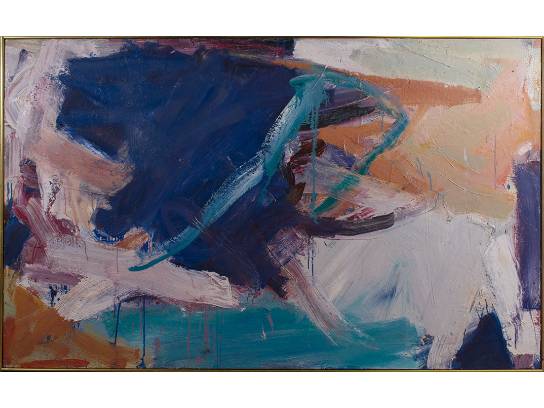
Fading Beauty
$0Fading Beauty, 1984
Acrylic painting, framed and signed
70 x 45"
Rowland studied abstract expressionism with Richard Diebenkorn, where she developed her own gestural vocabulary.
Price available upon request.
Artist Bio:
Susan Scott Rowland
1940 - 2019
Susan was a trustee of the Brooklyn Arts Council and was an avid supporter of Brooklyn Arts Council's mission to promote art in Brooklyn.
Her work is in major public and private collections, including the Whitney Museum of American Art, New York Historical Society, Santa Fe's Fine Arts Museum, and New Mexico's Roswell Museum and Art Center.
Rowland channeled an irrepressible exuberance through her work as a painter, printmaker and ceramicist. Rowland worked in New York for most of four decades, creating large, abstract expressionist canvasses and, later, pottery and sculpture with rough edges and whimsical animal forms. She graduated from Vassar College. In 1961 she married Dr. George B. "Robin'' Rowland. Her husband became a public health doctor when they moved to the Navajo reservation in Arizona with their two young children. Her restless personality and creative drive did not allow her to settle for long in one place. In 1967 she moved to New York City with her children. There, she studied at the Arts Students League. In 1974 she moved west again to a rural community north of Santa Fe, NM. She had space of her own in which to paint, and a rugged landscape to serve for inspiration. She was awarded a National Endowment for the Arts fellowship in 1976. Three years later, she returned to New York where she met and married her second husband, Charles P. "Tony'' Sifton, a judge in the US District Court in Brooklyn. After the terrorist attacks of 2001, Rowland pulled the first new weeds growing near Ground Zero the next spring to make monoprints. "I wanted to print the first plants that showed up, the weeds, the volunteers,'' Rowland said in a column by Times garden writer Anne Raver. She was a trustee of the non-profit Brooklyn Arts Council, where donations in Susan's name may be directed.
179
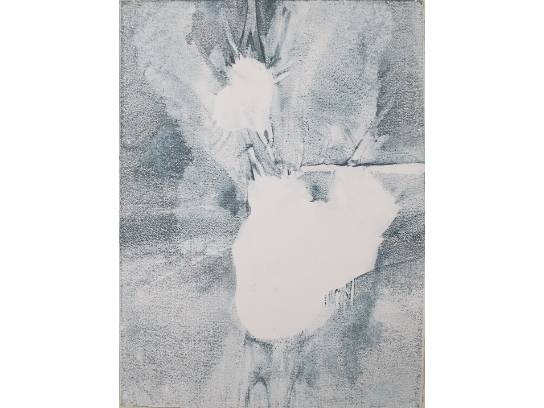
Ice 099
$0Ice 099, ~1998 - 2005
Monoprint, 1/1
22.5 x 30"
In addition to weeds, Rowland experimented with ice, snow and dog fur.
Price available upon request.
Artist Bio:
Susan Scott Rowland
1940 - 2019
Susan was a trustee of the Brooklyn Arts Council and was an avid supporter of Brooklyn Arts Council's mission to promote art in Brooklyn.
Her work is in major public and private collections, including the Whitney Museum of American Art, New York Historical Society, Santa Fe's Fine Arts Museum, and New Mexico's Roswell Museum and Art Center.
Rowland channeled an irrepressible exuberance through her work as a painter, printmaker and ceramicist. Rowland worked in New York for most of four decades, creating large, abstract expressionist canvasses and, later, pottery and sculpture with rough edges and whimsical animal forms. She graduated from Vassar College. In 1961 she married Dr. George B. "Robin'' Rowland. Her husband became a public health doctor when they moved to the Navajo reservation in Arizona with their two young children. Her restless personality and creative drive did not allow her to settle for long in one place. In 1967 she moved to New York City with her children. There, she studied at the Arts Students League. In 1974 she moved west again to a rural community north of Santa Fe, NM. She had space of her own in which to paint, and a rugged landscape to serve for inspiration. She was awarded a National Endowment for the Arts fellowship in 1976. Three years later, she returned to New York where she met and married her second husband, Charles P. "Tony'' Sifton, a judge in the US District Court in Brooklyn. After the terrorist attacks of 2001, Rowland pulled the first new weeds growing near Ground Zero the next spring to make monoprints. "I wanted to print the first plants that showed up, the weeds, the volunteers,'' Rowland said in a column by Times garden writer Anne Raver. She was a trustee of the non-profit Brooklyn Arts Council, where donations in Susan's name may be directed.
180
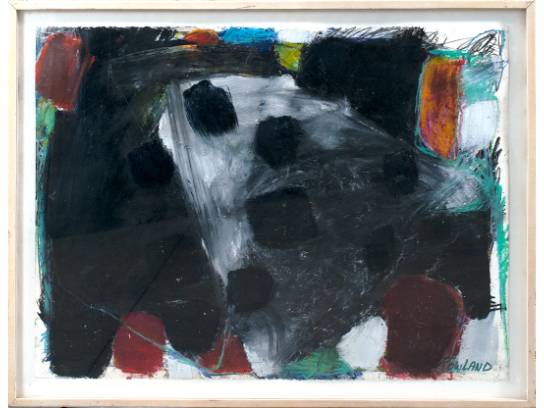
Untitled 022
$0Untitled 022, ~1980 - 1984
Mixed media, signed
21 x 28"
Rowland was fluent in many different media - paint, pastels, ceramics and prints.
Price available upon request.
Artist Bio:
Susan Scott Rowland
1940 - 2019
Susan was a trustee of the Brooklyn Arts Council and was an avid supporter of Brooklyn Arts Council's mission to promote art in Brooklyn.
Her work is in major public and private collections, including the Whitney Museum of American Art, New York Historical Society, Santa Fe's Fine Arts Museum, and New Mexico's Roswell Museum and Art Center.
Rowland channeled an irrepressible exuberance through her work as a painter, printmaker and ceramicist. Rowland worked in New York for most of four decades, creating large, abstract expressionist canvasses and, later, pottery and sculpture with rough edges and whimsical animal forms. She graduated from Vassar College. In 1961 she married Dr. George B. "Robin'' Rowland. Her husband became a public health doctor when they moved to the Navajo reservation in Arizona with their two young children. Her restless personality and creative drive did not allow her to settle for long in one place. In 1967 she moved to New York City with her children. There, she studied at the Arts Students League. In 1974 she moved west again to a rural community north of Santa Fe, NM. She had space of her own in which to paint, and a rugged landscape to serve for inspiration. She was awarded a National Endowment for the Arts fellowship in 1976. Three years later, she returned to New York where she met and married her second husband, Charles P. "Tony'' Sifton, a judge in the US District Court in Brooklyn. After the terrorist attacks of 2001, Rowland pulled the first new weeds growing near Ground Zero the next spring to make monoprints. "I wanted to print the first plants that showed up, the weeds, the volunteers,'' Rowland said in a column by Times garden writer Anne Raver. She was a trustee of the non-profit Brooklyn Arts Council, where donations in Susan's name may be directed.
181
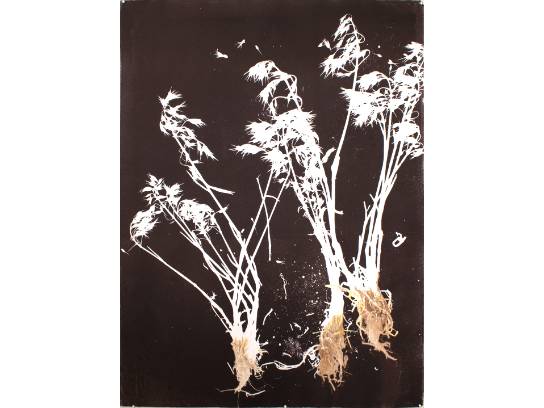
Botanical 054
$0Botanical 054, ~1998 - 2005
Monoprint, 1/1, Estate Stamp
22.5 x 30"
Rowland's brought her experimental mindset to the printmaking studio of Marina Ancona at Ten Grand Press.
Price upon request.
Artist Bio:
Susan Scott Rowland
1940 - 2019
Susan was a trustee of the Brooklyn Arts Council and was an avid supporter of Brooklyn Arts Council's mission to promote art in Brooklyn.
Her work is in major public and private collections, including the Whitney Museum of American Art, New York Historical Society, Santa Fe's Fine Arts Museum, and New Mexico's Roswell Museum and Art Center.
Rowland channeled an irrepressible exuberance through her work as a painter, printmaker and ceramicist. Rowland worked in New York for most of four decades, creating large, abstract expressionist canvasses and, later, pottery and sculpture with rough edges and whimsical animal forms. She graduated from Vassar College. In 1961 she married Dr. George B. "Robin'' Rowland. Her husband became a public health doctor when they moved to the Navajo reservation in Arizona with their two young children. Her restless personality and creative drive did not allow her to settle for long in one place. In 1967 she moved to New York City with her children. There, she studied at the Arts Students League. In 1974 she moved west again to a rural community north of Santa Fe, NM. She had space of her own in which to paint, and a rugged landscape to serve for inspiration. She was awarded a National Endowment for the Arts fellowship in 1976. Three years later, she returned to New York where she met and married her second husband, Charles P. "Tony'' Sifton, a judge in the US District Court in Brooklyn. After the terrorist attacks of 2001, Rowland pulled the first new weeds growing near Ground Zero the next spring to make monoprints. "I wanted to print the first plants that showed up, the weeds, the volunteers,'' Rowland said in a column by Times garden writer Anne Raver. She was a trustee of the non-profit Brooklyn Arts Council, where donations in Susan's name may be directed.
182
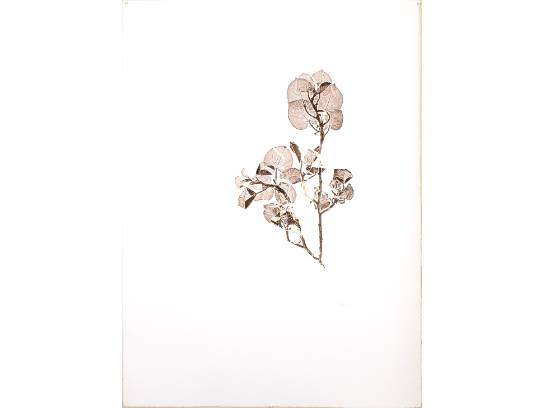
Botanical 046
$0Botanical 046, ~1998 - 2005
Monoprint, 1/1, Estate Stamp
22.5 x 30"
"I know the persistence of plants"- Susan Rowland
Price available upon request.
Artist Bio:
Susan Scott Rowland
1940 - 2019
Susan was a trustee of the Brooklyn Arts Council and was an avid supporter of Brooklyn Arts Council's mission to promote art in Brooklyn.
Her work is in major public and private collections, including the Whitney Museum of American Art, New York Historical Society, Santa Fe's Fine Arts Museum, and New Mexico's Roswell Museum and Art Center.
Rowland channeled an irrepressible exuberance through her work as a painter, printmaker and ceramicist. Rowland worked in New York for most of four decades, creating large, abstract expressionist canvasses and, later, pottery and sculpture with rough edges and whimsical animal forms. She graduated from Vassar College. In 1961 she married Dr. George B. "Robin'' Rowland. Her husband became a public health doctor when they moved to the Navajo reservation in Arizona with their two young children. Her restless personality and creative drive did not allow her to settle for long in one place. In 1967 she moved to New York City with her children. There, she studied at the Arts Students League. In 1974 she moved west again to a rural community north of Santa Fe, NM. She had space of her own in which to paint, and a rugged landscape to serve for inspiration. She was awarded a National Endowment for the Arts fellowship in 1976. Three years later, she returned to New York where she met and married her second husband, Charles P. "Tony'' Sifton, a judge in the US District Court in Brooklyn. After the terrorist attacks of 2001, Rowland pulled the first new weeds growing near Ground Zero the next spring to make monoprints. "I wanted to print the first plants that showed up, the weeds, the volunteers,'' Rowland said in a column by Times garden writer Anne Raver. She was a trustee of the non-profit Brooklyn Arts Council, where donations in Susan's name may be directed.
183
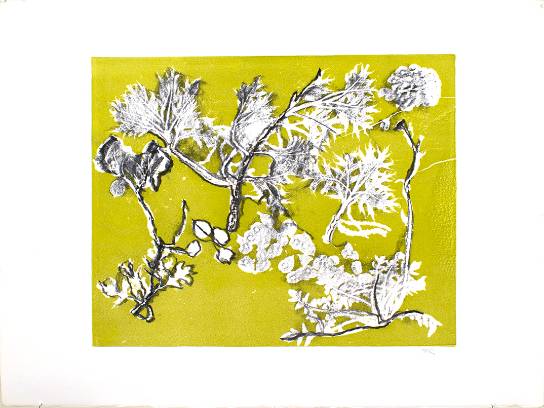
Botanical 079
$0Botanical 079, ~1998 - 2005
Monoprint with pastels, signed
30 x 22.5"
Unique among the monoprints, incorporating drawing.
Price available upon request.
Artist Bio:
Susan Scott Rowland
1940 - 2019
Susan was a trustee of the Brooklyn Arts Council and was an avid supporter of Brooklyn Arts Council's mission to promote art in Brooklyn.
Her work is in major public and private collections, including the Whitney Museum of American Art, New York Historical Society, Santa Fe's Fine Arts Museum, and New Mexico's Roswell Museum and Art Center.
Rowland channeled an irrepressible exuberance through her work as a painter, printmaker and ceramicist. Rowland worked in New York for most of four decades, creating large, abstract expressionist canvasses and, later, pottery and sculpture with rough edges and whimsical animal forms. She graduated from Vassar College. In 1961 she married Dr. George B. "Robin'' Rowland. Her husband became a public health doctor when they moved to the Navajo reservation in Arizona with their two young children. Her restless personality and creative drive did not allow her to settle for long in one place. In 1967 she moved to New York City with her children. There, she studied at the Arts Students League. In 1974 she moved west again to a rural community north of Santa Fe, NM. She had space of her own in which to paint, and a rugged landscape to serve for inspiration. She was awarded a National Endowment for the Arts fellowship in 1976. Three years later, she returned to New York where she met and married her second husband, Charles P. "Tony'' Sifton, a judge in the US District Court in Brooklyn. After the terrorist attacks of 2001, Rowland pulled the first new weeds growing near Ground Zero the next spring to make monoprints. "I wanted to print the first plants that showed up, the weeds, the volunteers,'' Rowland said in a column by Times garden writer Anne Raver. She was a trustee of the non-profit Brooklyn Arts Council, where donations in Susan's name may be directed.
184
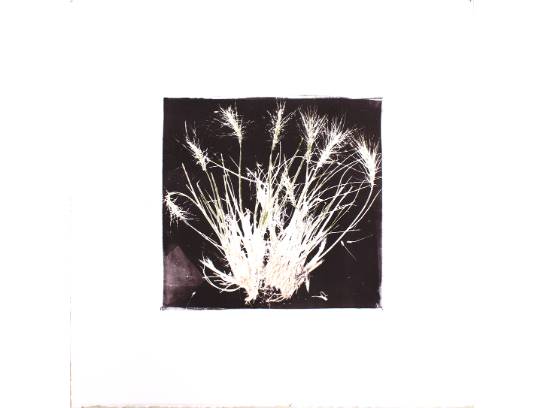
Grasses 060
$0Grasses 060, ~1998 - 2005
Monoprint, 1/1, Estate Stamp
22.5 x 22.5"
Price available upon request.
Artist Bio:
Susan Scott Rowland
1940 - 2019
Susan was a trustee of the Brooklyn Arts Council and was an avid supporter of Brooklyn Arts Council's mission to promote art in Brooklyn.
Her work is in major public and private collections, including the Whitney Museum of American Art, New York Historical Society, Santa Fe's Fine Arts Museum, and New Mexico's Roswell Museum and Art Center.
Rowland channeled an irrepressible exuberance through her work as a painter, printmaker and ceramicist. Rowland worked in New York for most of four decades, creating large, abstract expressionist canvasses and, later, pottery and sculpture with rough edges and whimsical animal forms. She graduated from Vassar College. In 1961 she married Dr. George B. "Robin'' Rowland. Her husband became a public health doctor when they moved to the Navajo reservation in Arizona with their two young children. Her restless personality and creative drive did not allow her to settle for long in one place. In 1967 she moved to New York City with her children. There, she studied at the Arts Students League. In 1974 she moved west again to a rural community north of Santa Fe, NM. She had space of her own in which to paint, and a rugged landscape to serve for inspiration. She was awarded a National Endowment for the Arts fellowship in 1976. Three years later, she returned to New York where she met and married her second husband, Charles P. "Tony'' Sifton, a judge in the US District Court in Brooklyn. After the terrorist attacks of 2001, Rowland pulled the first new weeds growing near Ground Zero the next spring to make monoprints. "I wanted to print the first plants that showed up, the weeds, the volunteers,'' Rowland said in a column by Times garden writer Anne Raver. She was a trustee of the non-profit Brooklyn Arts Council, where donations in Susan's name may be directed.
185
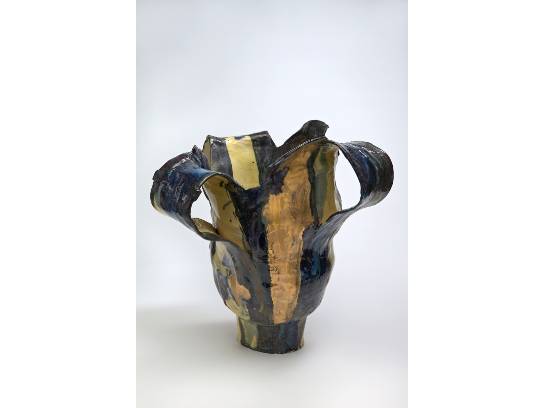
Vessel 057
$0Vessel 057, ~2002 - 2008
High Fired Glazed Stoneware, signed
19 H x 21 W
Rowland distorted classic vessel shapes.
Price available upon request.
Artist Bio:
Susan Scott Rowland
1940 - 2019
Susan was a trustee of the Brooklyn Arts Council and was an avid supporter of Brooklyn Arts Council's mission to promote art in Brooklyn.
Her work is in major public and private collections, including the Whitney Museum of American Art, New York Historical Society, Santa Fe's Fine Arts Museum, and New Mexico's Roswell Museum and Art Center.
Rowland channeled an irrepressible exuberance through her work as a painter, printmaker and ceramicist. Rowland worked in New York for most of four decades, creating large, abstract expressionist canvasses and, later, pottery and sculpture with rough edges and whimsical animal forms. She graduated from Vassar College. In 1961 she married Dr. George B. "Robin'' Rowland. Her husband became a public health doctor when they moved to the Navajo reservation in Arizona with their two young children. Her restless personality and creative drive did not allow her to settle for long in one place. In 1967 she moved to New York City with her children. There, she studied at the Arts Students League. In 1974 she moved west again to a rural community north of Santa Fe, NM. She had space of her own in which to paint, and a rugged landscape to serve for inspiration. She was awarded a National Endowment for the Arts fellowship in 1976. Three years later, she returned to New York where she met and married her second husband, Charles P. "Tony'' Sifton, a judge in the US District Court in Brooklyn. After the terrorist attacks of 2001, Rowland pulled the first new weeds growing near Ground Zero the next spring to make monoprints. "I wanted to print the first plants that showed up, the weeds, the volunteers,'' Rowland said in a column by Times garden writer Anne Raver. She was a trustee of the non-profit Brooklyn Arts Council, where donations in Susan's name may be directed.
186
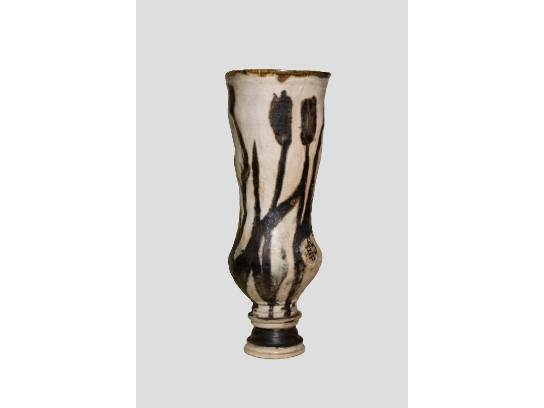
Vessel 004
$0Vessel 004, ~2002 - 2008
High Fired Glazed Stoneware, Estate Stamp
21.75 H x 7 D
Rowland created gestural flowers with the glaze.
Price available upon request.
Artist Bio:
Susan Scott Rowland
1940 - 2019
Susan was a trustee of the Brooklyn Arts Council and was an avid supporter of Brooklyn Arts Council's mission to promote art in Brooklyn.
Her work is in major public and private collections, including the Whitney Museum of American Art, New York Historical Society, Santa Fe's Fine Arts Museum, and New Mexico's Roswell Museum and Art Center.
Rowland channeled an irrepressible exuberance through her work as a painter, printmaker and ceramicist. Rowland worked in New York for most of four decades, creating large, abstract expressionist canvasses and, later, pottery and sculpture with rough edges and whimsical animal forms. She graduated from Vassar College. In 1961 she married Dr. George B. "Robin'' Rowland. Her husband became a public health doctor when they moved to the Navajo reservation in Arizona with their two young children. Her restless personality and creative drive did not allow her to settle for long in one place. In 1967 she moved to New York City with her children. There, she studied at the Arts Students League. In 1974 she moved west again to a rural community north of Santa Fe, NM. She had space of her own in which to paint, and a rugged landscape to serve for inspiration. She was awarded a National Endowment for the Arts fellowship in 1976. Three years later, she returned to New York where she met and married her second husband, Charles P. "Tony'' Sifton, a judge in the US District Court in Brooklyn. After the terrorist attacks of 2001, Rowland pulled the first new weeds growing near Ground Zero the next spring to make monoprints. "I wanted to print the first plants that showed up, the weeds, the volunteers,'' Rowland said in a column by Times garden writer Anne Raver. She was a trustee of the non-profit Brooklyn Arts Council, where donations in Susan's name may be directed.
187
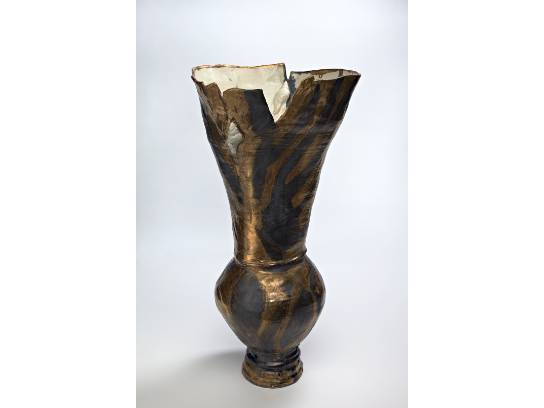
Vessel 012
$0Vessel 012, ~2002 - 2008
High fired glazed stoneware, Estate stamp
This nuanced vessel incorporates seashells and tears.
Price available upon request.
Artist Bio:
Susan Scott Rowland
1940 - 2019
Susan was a trustee of the Brooklyn Arts Council and was an avid supporter of Brooklyn Arts Council's mission to promote art in Brooklyn.
Her work is in major public and private collections, including the Whitney Museum of American Art, New York Historical Society, Santa Fe's Fine Arts Museum, and New Mexico's Roswell Museum and Art Center.
Rowland channeled an irrepressible exuberance through her work as a painter, printmaker and ceramicist. Rowland worked in New York for most of four decades, creating large, abstract expressionist canvasses and, later, pottery and sculpture with rough edges and whimsical animal forms. She graduated from Vassar College. In 1961 she married Dr. George B. "Robin'' Rowland. Her husband became a public health doctor when they moved to the Navajo reservation in Arizona with their two young children. Her restless personality and creative drive did not allow her to settle for long in one place. In 1967 she moved to New York City with her children. There, she studied at the Arts Students League. In 1974 she moved west again to a rural community north of Santa Fe, NM. She had space of her own in which to paint, and a rugged landscape to serve for inspiration. She was awarded a National Endowment for the Arts fellowship in 1976. Three years later, she returned to New York where she met and married her second husband, Charles P. "Tony'' Sifton, a judge in the US District Court in Brooklyn. After the terrorist attacks of 2001, Rowland pulled the first new weeds growing near Ground Zero the next spring to make monoprints. "I wanted to print the first plants that showed up, the weeds, the volunteers,'' Rowland said in a column by Times garden writer Anne Raver. She was a trustee of the non-profit Brooklyn Arts Council, where donations in Susan's name may be directed.
188
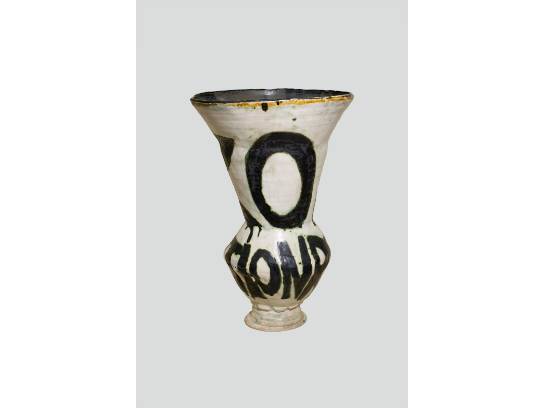
KO Revolution
$0KO Revolution, ~2002 - 2008
High fired glazed stoneware, signed
15.5 H x 10.25 D
Rowland collaborated with poet Frederick Seidel to incorporate phrases on her vessels.
Price available upon request.
Artist Bio:
Susan Scott Rowland
1940 - 2019
Susan was a trustee of the Brooklyn Arts Council and was an avid supporter of Brooklyn Arts Council's mission to promote art in Brooklyn.
Her work is in major public and private collections, including the Whitney Museum of American Art, New York Historical Society, Santa Fe's Fine Arts Museum, and New Mexico's Roswell Museum and Art Center.
Rowland channeled an irrepressible exuberance through her work as a painter, printmaker and ceramicist. Rowland worked in New York for most of four decades, creating large, abstract expressionist canvasses and, later, pottery and sculpture with rough edges and whimsical animal forms. She graduated from Vassar College. In 1961 she married Dr. George B. "Robin'' Rowland. Her husband became a public health doctor when they moved to the Navajo reservation in Arizona with their two young children. Her restless personality and creative drive did not allow her to settle for long in one place. In 1967 she moved to New York City with her children. There, she studied at the Arts Students League. In 1974 she moved west again to a rural community north of Santa Fe, NM. She had space of her own in which to paint, and a rugged landscape to serve for inspiration. She was awarded a National Endowment for the Arts fellowship in 1976. Three years later, she returned to New York where she met and married her second husband, Charles P. "Tony'' Sifton, a judge in the US District Court in Brooklyn. After the terrorist attacks of 2001, Rowland pulled the first new weeds growing near Ground Zero the next spring to make monoprints. "I wanted to print the first plants that showed up, the weeds, the volunteers,'' Rowland said in a column by Times garden writer Anne Raver. She was a trustee of the non-profit Brooklyn Arts Council, where donations in Susan's name may be directed.
189
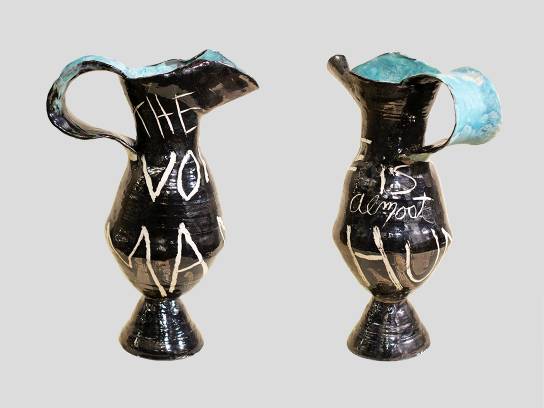
The Voice is Almost Human
$0The Voice is Almost Human, 1991
High fired glaze stoneware, signed
6 W x 11 D x 16 H
Susan Rowland collaboration with Frederick Seidel. Inspired by calligraphic pottery in Tunis.
Price available upon request.
Artist Bio:
Susan Scott Rowland
1940 - 2019
Susan was a trustee of the Brooklyn Arts Council and was an avid supporter of Brooklyn Arts Council's mission to promote art in Brooklyn.
Her work is in major public and private collections, including the Whitney Museum of American Art, New York Historical Society, Santa Fe's Fine Arts Museum, and New Mexico's Roswell Museum and Art Center.
Rowland channeled an irrepressible exuberance through her work as a painter, printmaker and ceramicist. Rowland worked in New York for most of four decades, creating large, abstract expressionist canvasses and, later, pottery and sculpture with rough edges and whimsical animal forms. She graduated from Vassar College. In 1961 she married Dr. George B. "Robin'' Rowland. Her husband became a public health doctor when they moved to the Navajo reservation in Arizona with their two young children. Her restless personality and creative drive did not allow her to settle for long in one place. In 1967 she moved to New York City with her children. There, she studied at the Arts Students League. In 1974 she moved west again to a rural community north of Santa Fe, NM. She had space of her own in which to paint, and a rugged landscape to serve for inspiration. She was awarded a National Endowment for the Arts fellowship in 1976. Three years later, she returned to New York where she met and married her second husband, Charles P. "Tony'' Sifton, a judge in the US District Court in Brooklyn. After the terrorist attacks of 2001, Rowland pulled the first new weeds growing near Ground Zero the next spring to make monoprints. "I wanted to print the first plants that showed up, the weeds, the volunteers,'' Rowland said in a column by Times garden writer Anne Raver. She was a trustee of the non-profit Brooklyn Arts Council, where donations in Susan's name may be directed.
190
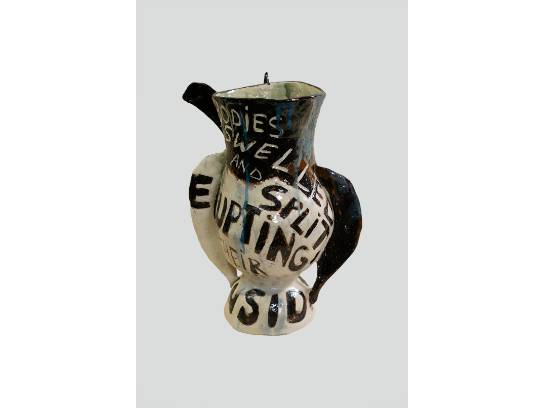
Erupting Their Insides
$0Erupting Their Insides, ~1990 - 1997
High fired glazed stoneware, Estate stamp
13.5 H x 10.5 D
Susan Rowland collaboration with Frederick Seidel. A potent metaphor between the visual and visionary.
Price available upon request.
Artist Bio:
Susan Scott Rowland
1940 - 2019
Susan was a trustee of the Brooklyn Arts Council and was an avid supporter of Brooklyn Arts Council's mission to promote art in Brooklyn.
Her work is in major public and private collections, including the Whitney Museum of American Art, New York Historical Society, Santa Fe's Fine Arts Museum, and New Mexico's Roswell Museum and Art Center.
Rowland channeled an irrepressible exuberance through her work as a painter, printmaker and ceramicist. Rowland worked in New York for most of four decades, creating large, abstract expressionist canvasses and, later, pottery and sculpture with rough edges and whimsical animal forms. She graduated from Vassar College. In 1961 she married Dr. George B. "Robin'' Rowland. Her husband became a public health doctor when they moved to the Navajo reservation in Arizona with their two young children. Her restless personality and creative drive did not allow her to settle for long in one place. In 1967 she moved to New York City with her children. There, she studied at the Arts Students League. In 1974 she moved west again to a rural community north of Santa Fe, NM. She had space of her own in which to paint, and a rugged landscape to serve for inspiration. She was awarded a National Endowment for the Arts fellowship in 1976. Three years later, she returned to New York where she met and married her second husband, Charles P. "Tony'' Sifton, a judge in the US District Court in Brooklyn. After the terrorist attacks of 2001, Rowland pulled the first new weeds growing near Ground Zero the next spring to make monoprints. "I wanted to print the first plants that showed up, the weeds, the volunteers,'' Rowland said in a column by Times garden writer Anne Raver. She was a trustee of the non-profit Brooklyn Arts Council, where donations in Susan's name may be directed.

